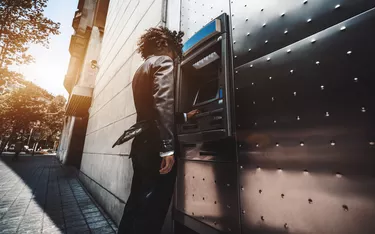
Making a withdrawal from a bank account refers to taking money out of the account. There are a number of ways to do this, including going to a physical bank branch or ATM, transferring money electronically with a website or an app, using a debit card and writing an old-fashioned paper check. Different approaches work for different purposes, and it's a good idea to keep track of any fees or rewards from using one method over another.
Making a Bank Withdrawal
Video of the Day
One way to make a withdrawal from your bank account is to simply walk into a bank and ask for cash. Depending on your bank, you may be able to do this verbally by speaking to a teller or you may have to fill out a withdrawal slip with the amount of money you want or write out a check to yourself. If you have a passbook savings account, where a printed book keeps track of your holdings in the bank, you may need to present the passbook to make a withdrawal.
Video of the Day
You may also be asked to show identification. Check your bank's policies online or inquire at a branch to learn the best procedure for your account and your needs.
Assuming you have enough money in your account, the teller will hand you your cash along with a receipt. Make sure you hold on to the receipt, verify it's correct and that you received the right amount of cash. Check later that the right amount was debited from your account by examining your bank statement or your online banking site.
Using an ATM
If you have a checking account or another account with an ATM or debit card, you can use that card to make withdrawals from your account. Insert the card into an ATM, securely enter your PIN and follow the instructions to indicate how much you want to withdraw. Verify you got the right amount of money and that your receipt is correct, contacting your bank as soon as possible to contest any issues or report any malfunction.
Keep in mind that if you use an ATM other than one provided by your bank, you may be required to pay a fee. Your bank, the ATM operator or both may impose a fee. Some banks and credit unions will refund you fees charged by other financial institutions to use ATMs or may allow you to use other ATMs within a certain network for free. Check your bank's policies for details so that you don't pay unnecessarily to access your own money.
Using Your Debit Card
Many banks provide account holders with debit cards, which in addition to working at ATMs can be used for everyday purchases. The money is withdrawn from your account essentially immediately, and you can use these at many stores and for online purchases.
Some banks provide rewards for customers using their debit cards, so it may be more or less advantageous than other payment methods. Check your bank's policy for details.
Writing a Check
Another way to make a bank withdrawal is to write someone a check to pay for something. Some banks may charge you to obtain checks beyond a certain number in a certain time period.
Fill out the check, indicating how much you want to pay, who you are paying and the date of the payment. If you want to leave a note about the reason for the payment, put it in the memo field. When you've verified the check is correct, sign it. If you make a mistake, write "VOID" across the check so it can't be stolen and reused and then shred it.
Keep track of the checks you've written that haven't yet been cashed. If you write checks that can't be paid by what's in your account, you may have to pay overdraft charges to your bank or fees to whoever you wrote the check to. It is illegal to deliberately write checks that aren't backed by your funds.
Making Online Payments
Many banks provide ways to withdraw money online to pay bills, send it to friends and family or transfer it to other accounts. Visit your online banking portal or app for details.
You can also use third-party apps, such as PayPal, Square's Cash App and Venmo, to send money and pay for goods and services. Many require a debit card, and some may charge fees. Check the apps to see which your bank supports and how to set them up.